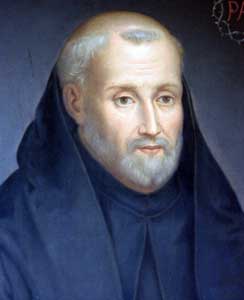Howton Grove Priory | Mobile WebsiteSharing a Vocation with the World . . .

Prayer
Prayer is so simple yet we tend to make hard work of it. We forget that it is a relationship with God, and like all relationships, needs nurturing if it is to grow. One of the first things we have to learn is that if we do all the talking, we'll end up talking to ourselves. We have to get used to the idea of a conversation with God made up of many elements: adoration, contrition, thanksgiving and supplication (easy to remember by the first letters: ACTS).We can take courage from the fact that the gift of prayer was poured into our hearts at baptism. All we have to do is to allow that gift to grow by providing the right conditions. In practice, that means
- choose a quiet place where you can be reasonably sure of not being interrupted — it doesn't have to be completely soundless, sometimes that is more of a distraction than a help;
- find a comfortable position — sitting is fine, provided you keep your back straight — but not so comfortable you fall asleep;
- perhaps read a few words of scripture at the beginning, or light a candle or focus on a crucifix or icon — just to quieten your mind;
- listen to your breathing and the sounds about you — gradually your breathing will become slower and the noises cease to intrude;
- try to pray at the same time(s) each day; regularity is more important than the length of time we give to prayer, although most people find ten to fifteen minutes morning and evening quite enough to begin with;
- don't try to rush things — it takes time to become comfortable with silence; and don't lose heart if you feel you are not progressing, we often feel we are going backwards in prayer because we don't see what God sees.
Above all, "pray as you can, not as you can't". Don't be afraid to voice your concerns or ask God for help. You are the apple of his eye: is it likely that he would not want to hear about what matters to you? But remember that God tends to speak in whispers rather than loud shouts. We need to tune into his silence and that takes time.
It may be that if you follow this way of praying for a while, you will find spontaneous prayer arising in you, or a peaceful, quiet resting in God. Trust him, and follow where his Spirit leads.

Contemplative Prayer
It is sometimes said that Benedict ignores contemplative prayer, choosing instead to concentrate on liturgical prayer, as though there were some sort of opposition between the two. It might be more accurate to say that prayer is so central to Benedict's understanding of monastic life that he sees no need to write a treatise on the subject. For him, liturgical prayer led naturally to private prayer and vice versa.Benedict's disciples have been less reticent in the matter of treatises. Indeed, the prayer of our own community has been shaped and formed by what is called the Bakerite tradition. From 1624 to 1633 Fr Augustine Baker was entrusted with helping the young community of nuns at Cambrai (later Stanbrook). He took his duties seriously and wrote extensively on prayer and the spiritual life, insisting that the nuns read solidly in the scriptures and the Fathers. His work was rooted in the medieval English mystical tradition, and it is largely thanks to him that that tradition is still alive and practised among Benedictines today.
His most apt pupil was initially the most unlikely: the great-great-granddaughter of St Thomas More had no time for Fr Baker and rebelled against his teaching until she suffered a conversion and died a saintly death at the age of twenty-eight. Today we read Fr Baker more than we read D. Gertrude More but both teach the same doctrine: "a simple, naked intent unto God". D. Catherine Gascoigne, the first abbess of Cambrai, and a much less wordy author than either, summed up this "Bakerite" way of prayer thus:
'My prayer I know not how to express, but it seems to me to be a longing and vehement desire of the soull thirsting after the presence of God, seeking and intending only and wholy his will and pleasure with as much purity of intention as my imperfection will permit. it is only exercised in the will, some times in one maner, & sometimes in another; according to the present disposition of the soull.'
Copyright © 2007-2017 Holy Trinity Monastery, a charitable company limited by guarantee & incorporated in England and Wales | Company No. 7487215 | Reg. Charity No. 1144001 | Registered office as above | All Rights Reserved | Terms of Service | Privacy Policy | Contact |